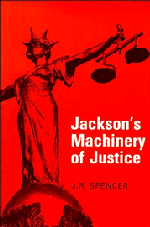Book contents
- Frontmatter
- Contents
- Acknowledgements
- List of figures
- List of tables
- Preface
- Preface to the first edition of ‘The Machinery of Justice in England’
- Abbreviations
- I Historical introduction
- II Civil jurisdiction
- III Tribunals
- IV Criminal jurisdiction
- V The personnel of the law
- 27 Solicitors
- 28 Barristers
- 29 Legal education
- 30 Should the profession continue to be divided into barristers and solicitors?
- 31 Judges
- 32 Juries
- 33 Lay justices and stipendiary magistrates
- 34 The administration of the courts
- VI The European dimension
- VII The cost of the law
- VIII Law Reform
- Appendix A The Report of the Civil Justice Review
- Table of Cases cited
- Table of Statutes cited
- Table of Stationery Office publications cited
- Index
30 - Should the profession continue to be divided into barristers and solicitors?
Published online by Cambridge University Press: 10 January 2011
- Frontmatter
- Contents
- Acknowledgements
- List of figures
- List of tables
- Preface
- Preface to the first edition of ‘The Machinery of Justice in England’
- Abbreviations
- I Historical introduction
- II Civil jurisdiction
- III Tribunals
- IV Criminal jurisdiction
- V The personnel of the law
- 27 Solicitors
- 28 Barristers
- 29 Legal education
- 30 Should the profession continue to be divided into barristers and solicitors?
- 31 Judges
- 32 Juries
- 33 Lay justices and stipendiary magistrates
- 34 The administration of the courts
- VI The European dimension
- VII The cost of the law
- VIII Law Reform
- Appendix A The Report of the Civil Justice Review
- Table of Cases cited
- Table of Statutes cited
- Table of Stationery Office publications cited
- Index
Summary
The distinction between the Bar and solicitors is, on the face of it, somewhat odd. There is nothing peculiar in having specialists within a profession, but it is unusual to find that the citizen is obliged to employ two men to do the work that he would willingly entrust to one of them. Fortunately for the citizen, for most types of the legal business this situation does not arise. ‘The business of the legal professions is as to about nine-tenths concerned with matters affecting the daily life of the community outside the courts, and the remaining one-tenth which attracts great public attention, is litigation and criminal business.’ For litigation in the civil or criminal courts, however, the citizen frequently has to employ both a solicitor and a barrister, whether he wants to do so or not. The Bar has a virtual monopoly in the conduct of cases in the higher civil and criminal courts (together with a virtual monopoly over all but the lowest judicial appointments). And although barristers conduct cases in the higher courts, the preparation of these cases has to be done by solicitors, not barristers, and it is a rule that no barrister may deal directly with a client, as clients have access to barristers only through solicitors.
- Type
- Chapter
- Information
- Jackson's Machinery of Justice , pp. 353 - 361Publisher: Cambridge University PressPrint publication year: 1989

